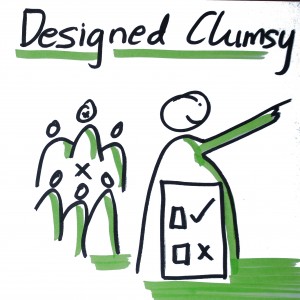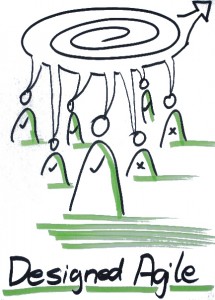Wordcount: 420
Teachers in the UK were on strike yesterday. “We have no other choice” they said.
 The UK institutions of teaching are designed to be clumsy. As are almost all companies, from the smallest to the largest.
The UK institutions of teaching are designed to be clumsy. As are almost all companies, from the smallest to the largest.
Clumsy because almost all stakeholders have no other power than the brutal choice between working or not working. Buying or not buying.
Yesterday, the teachers’ intent centres on finding better ways to be energised and enabled so that they can best help their pupils grow.
The funny thing is, that is the same thing that the government seems to want. And most parents. And the future employers of these pupils.
And the pupils themselves.
Each stakeholder group sees a different part of the whole. Sees how aspects of the current institution prevents teachers having the impact everyone wants. However, no one stakeholder group has, nor can possibly ever have, enough grasp of the whole and of each tiny element. Enough for that group to be able to unilaterally define what works and lead towards implementing what works.
The teachers are saying “We are leaders. Leaders within the scope of the job we’re doing.”
Leading works when there is sufficient power. And that power is suitable for subtle use, in many different ways, appropriately and timely. If the only power someone has is the blunt, clumsy work / not work choice, then you have designed a clumsy institution. A dumb institution.
 You design a wise, agile, effective institution when each stakeholder, in each part of the institution, (whether inside or outside the boundary walls of the institution) is
You design a wise, agile, effective institution when each stakeholder, in each part of the institution, (whether inside or outside the boundary walls of the institution) is
- enabled to lead their part of the whole
- supported by structured dialogue processes for their voice to be fully heard early enough by all other parts of the institution.
- with enough different ways of exercising power to underpin their voice.
When we fail to do that, we succeed in designing clumsiness. Designing an excellent way of turning large institutions of people united by the same goal into small factions divided by the diversity of roles.
To thrive in today’s ever more complex world, we need everyone to step up and lead their part of the diverse whole.
So we ought to have structures and processes that give all these diverse people a suitably wide range of power and voice to express their leadership capability fully.
We need the wisdom that comes from enfranchised, emancipated organisations. Organisations where all stakeholders have the power and voice to lead their part of the complex whole.